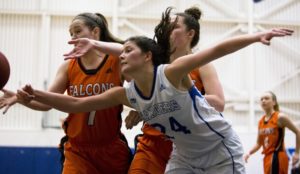The seasons are over for both the Camosun Chargers men’s and women’s basketball teams.
The Chargers men’s basketball team finished off their season with an eighth-place national ranking at the Canadian Collegiate Athletic Association (CCAA) national championships. Head coach Scot Cuachon says that the nature of the college’s many two-year programs and struggles with the higher tuition international students pay are a difficulty for the Chargers when they’re competing with teams at a national level.
“The most challenging thing we face is more on the recruiting side,” says Cuachon. “And I think that’s the program as a whole—you know, collegially, us being generally a two-year school playing against a lot of five-year schools. We’re lucky this year that we have guys in a lot of five-year programs, so we’ve got guys in business and accounting and things like that.”

The Chargers men’s team came away winless at the CCAA national championships; Cuachon says they have to, generally speaking, get better to be able to compete at the national level. Looking ahead, there is change afoot for the lineup of the team.
“We’re losing certain guys, which has some positives and some negatives to it because it gives us a chance to upgrade in some divisions if we can. We need to shoot the ball a lot better; we need to be able to score a little more. We were heavy on our defence this year, which is a big part of basketball, but it’s only one part of it.”
Cuachon says that bringing in more international students is key to success in the future.
“Not being able to offer international athletes a tuition at par is something that really, really sets us back. I was talking to a lot of coaches during a press conference and they rely heavily on their international students and being able to offer international students at par on a domestic tuition, which we can’t. That always puts us behind the eight-ball a little bit, but we’ve got to find a way to get around it if we can.”
Despite these struggles, Cuachon is quick to point out that team chemistry this year was great and that the player identification camp, which took place April 15 and 16, helped fill in some of the missing pieces on the court.
“There were a lot of great people who came out,” he says, “and now it’s just about evaluating if they can fill our needs or if we’ve got to keep searching elsewhere.”
Meanwhile, the women’s team finished in sixth place in the Pacific Western Athletic Association provincials this year. Head coach Carl Macdonald says he strives to play “a very up-tempo, quick-paced game” that is more on par with the national level than the provincial.
“We’re looking to improve on our shooting, we’re looking to improve on our speed,” he says. “We want to play a faster game next year, so those are the things that we’re looking for in our recruiting.”
Macdonald says the challenge for him lies both in recruiting and on the floor. As Cuachon mentioned, Camosun is by and large a two-year school, which poses some challenges for Macdonald and his team that many other schools don’t have to deal with.
“We have to develop our players into the equivalent of fourth- and fifth-year players in two or three years,” says Macdonald.
The women’s basketball team made it into the playoffs, but lost to the Capilano Blues 66-80. Despite the loss, the Chargers’ Kathryn Candell was the provincial league leader of points per game, Kelly Young was second in the league in rebounding, and Rachael Bakker finished with the second-highest scoring percentage.
“We had a sixth-place team,” says Macdonald, “yet we had three players that really stepped up and showed me quality.”
Macdonald says he was pleased with the way the players grew and developed throughout the year.
“Team chemistry developed over the course of the year into a really strong, solid group of players,” he says. “It was great in that aspect.”
Despite not having all the results in the Chargers’ favour, Macdonald says he will strive to play a game of transition basketball in the future to help get his team up to national-level standards.
“In our league, it’s a slower, more methodical kind of a game, and so we’re looking to change to being a game that’s more in line with a game that’s played in other provinces, like Ontario and Quebec.”
It’s back to the drawing board for Macdonald and his team, but he says that in retrospect he “feels great” about the season and how the players responded to his coaching style.
“As a coach I feel really great that we have players that can understand what we’re trying to do and execute it, and despite all three of them [Candell, Bakker, and Young] facing the toughest opponents from the other teams, they were able, individually, to step up.”
